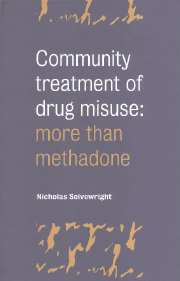Book contents
- Frontmatter
- Contents
- Foreword by Professor John Strang
- Preface and acknowledgements
- Introduction: community treatment in context
- Part I Treatments
- Part II Providing clinical services
- 5 Community drug services
- 6 Treatment of drug misuse in primary care
- 7 Balancing security and accessibility
- 8 Dual diagnosis – drug misuse and psychiatric disorder
- Epilogue Future directions
- Appendix 1 Protocols for quick detoxification from heroin
- Appendix 2 Opioid equivalent dosages
- Glossary
- References
- Index
8 - Dual diagnosis – drug misuse and psychiatric disorder
Published online by Cambridge University Press: 17 August 2009
- Frontmatter
- Contents
- Foreword by Professor John Strang
- Preface and acknowledgements
- Introduction: community treatment in context
- Part I Treatments
- Part II Providing clinical services
- 5 Community drug services
- 6 Treatment of drug misuse in primary care
- 7 Balancing security and accessibility
- 8 Dual diagnosis – drug misuse and psychiatric disorder
- Epilogue Future directions
- Appendix 1 Protocols for quick detoxification from heroin
- Appendix 2 Opioid equivalent dosages
- Glossary
- References
- Index
Summary
Introduction
One of the reasons why drug misuse is managed substantially as a psychiatric specialty is that it is strongly associated with various pervasive and clinically important psychiatric conditions. Studies have examined the relationship both ways round – that is, investigating rates of mental disorders in drug misusers, or the extent of drug misuse in mentally ill populations, and some of these are discussed here. In practice, clinicians must be skilled in recognizing personality disorder (often as a continuation of adolescent conduct disorder), depression, and anxiety states, all of which are extremely common and need to be distinguished from the effects of drug misuse itself. Personality disorder is particularly important, as it is often the main cause of abnormal mood in drug misusers and it exerts strong negative effects on many forms of treatment; the first part of the chapter focuses on this and the difficult area of drug-induced psychosis. The rest of the chapter is then given over to a discussion from the other perspective, of substance misuse problems in those with severe mental illness, as the rising rates of such problems are currently posing great difficulties in the provision of general psychiatric treatment in the community.
The management of those with schizophrenia and other psychotic conditions who misuse drugs is highly problematic, partly because such individuals do not comply well with conventional addiction treatment approaches, and a literature is emerging on ultra-specialist services for that group.
- Type
- Chapter
- Information
- Community Treatment of Drug MisuseMore than Methadone, pp. 190 - 203Publisher: Cambridge University PressPrint publication year: 1999



